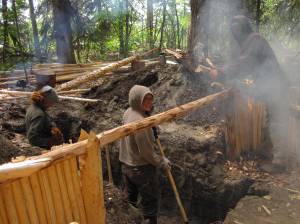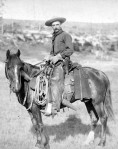Often when folks find out I’m into primitive living in places like the Northwoods of Wisconsin or the Interior of Alaska, one of the first questions they ask me is “How do you deal with mosquitoes?” Or “What’s the best natural mosquito repellent?”
For a long time I was unsure how to answer, there didn’t seem to be one simple replacement for DEET. But it finally dawned on me.
Now I say “woodsmoke.”
While enjoying a winter in an earth-lodge in the Northwoods of Wisconsin (Ojibwe terrirory, where the food grows on the water — i.e. where wild rice lives), I was taught (won’t say “I learned”) the art of the smokeless fire. That art is very important if one is going to live long with an open fire inside one’s lodge. It’s mostly achieved by using the right species of hardwood (maple works pretty good), very dry, in finger and thumb sized pieces, over a hearth that has a good air intake coming up from underneath. Lots of air, with dry, small pieces of hardwood, and you’ve got a nice smokeless fire fit for magical evenings in a primitive lodge.
But you could sit next to that same kind of fire outside in June and get eaten alive by sister mosquito.
So when it comes to being outside in the first half of the Alaskan summer, I’ll take a smokey fire any day. In the Boreal forest of Alaska, a good cloud of woodsmoke will drive away mossies better than a whole can of Deet.
It makes sense if you think about it. Every summer large parts of the Boreal forest burn. In Alaska, the average is somewhere around 100,000 acres. But it’s all okay. In fact, it’s for the best. Spruce almost seems to know this. They grow in such a way that they literally become tinderboxes, and the older they get, the more of a tinderbox the woods become. It’s a wonderful gift really — anyone who has ever been in desperate need of a warm fire in the middle of a cold Alaskan winter knows how awesome Spruce is. And how easy it can be to get dry kindling that lights up with a single match (or even easier with a touch of birch bark). It’s almost as if Spruce wants to burn.
And interestingly enough, Spruce is the climax tree species in the Alaskan interior. The woods may start out with Aspen or Cottonwoods or Birch, but eventually they wind up Spruce. So if Spruce didn’t burn every summer, that’s pretty much all we would have up here. Instead, spruce creates the conditions for it’s own demise. And when it burns it feeds the soil so Aspens or Cottonwoods or Birch can grow next. But if you’ll walk into most Cottonwood or Birch groves, you’ll find a few slow growing Spruce in there. Eventually they will take over, and the whole cycle starts again. All because of how Spruce relates to Fire.
So what does that have to do with our little buzzing blood-sucking sisters? Well, to her woodsmoke is bad news. No surprise, really. She can’t tell if that smoke is from a campfire or a forest fire, she just knows it’s bad. And she’s a delicate flier who can’t just “bug out” at a moment’s notice and leave a raging Spruce fire in the dust. So she tends to stay away (a lot like many humans feel about her, I reckon). At least that’s my theory.
So how do you make a smokey fire? Well, you pretty much reverse the skill used in that Northwoods earth-lodge to make a smokeless one. Find some big pieces of damp, marginal-burning wood and stick them on the fire in a way that very little air can get to them. Just don’t over do it. The best zone for smoke is a fire that’s just about to burst into flame, but can’t quite do it yet. If you can find that zone, you can make smoke that will send sister mosquito running for cover.
So it seems there’s more than one way to feed a fire. And from my own personal experience, many primitive skills are contextual, that is, relative — which is to say they are about relationship. There are very few one-size-fits-all solutions when it comes to primitive living. Instead, what works in one place, or in one season, may not work in another. One may learn how to make a smokeless fire inside a winter lodge and then feel like a primitive bad-ass, but then outside during mosquito season a heavy smoke may be just what makes life a pleasure to enjoy.
So really, the best primitive bug repellent probably isn’t even woodsmoke, it’s more likely contextual knowledge. It’s knowing how to be in an ever-flowing relationship with one’s fellow beings in this big wild world. How to discern what they’re all doing, figure out what might be the best response, and then do it. At least that’s my theory.
Knowledge: The best replacement for DEET.
Actually, that’s not quite right either…there’s probably even more to the story. But we’ll go there some other time, maybe. Right now I’ve got friends waiting for me in the woods…and as you may have figured from the pictures, we’re building an earth lodge.
Wild peace,
Glenn






I think this is how Thoreau kept the skeeters off his flesh in the New England wilderness, too. I’m inclined to believe that a citronella candle doesn’t work so much because of the citronella, but because of the oily smoke it produces.
I didn’t know (or remember, perhaps) that about Thoreau…that’s cool. And your assessment of citronella fits with my experience too. Thanks Jonathan.
We used to put fresh green grass on the fire to smudge it and make smoke against the mosquitoes.
Nice Gitte. I imagine that works great.
I just wanted to say that if you wanted a more personal little mosquito repelent that is just as effective (but maybe not as natural as firewood) you can use kitchen paper towels. All you have to do is roll them up real good (but not too tight) and light one end on fire. It’ll burn slow and smooth and the little bit smoke it produces is enough to repel the mosquitos around you’re body. Just hold the rolled paper in your hand and swing it around you when the mosquitos start to surround you.
Or you can light a small wood log that fits in tour hand and carry it around with you, hehe. But basically the reason a rolled up kitchen paper towel or wood logs repel mosquitos is because of the smoke; yup, the a secret is in the smoke. Mosquitos cant stand the strong smoke so they flee trying to get fresh air elsewhere before they die from inhaling the dangerous smoke.
The smoke from kitchen paper towels is very strong so if you use them be careful not to inhale the dangerous smoke for to long. By the way, kitchen paper towels serve as great tinder as well so if you choose to have at it.